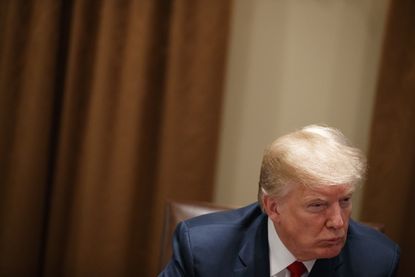Trump's stock market recoil
Trump loved the stock market — until it didn't love him back


American presidents cannot help but pay attention to the stock market. The reasons should be obvious: While many observers dismiss the market's performance as being largely divorced from the country's economic fundamentals, it's undeniable that over the long run, at least, the markets can tell a meaningful story about the U.S. economy. And fairly or not, presidents take credit or receive blame for economic and market performance on their watch.
The thing is, stock market performance really is correlated to economic growth. As legendary investor Warren Buffett noted in his most recent shareholder letter, America's "staggering" economic achievements in the 20th century were reflected in the Dow Jones Industrial Average climbing more than 17,000 percent, from 66 to 11,497. Likewise, years of anemic markets can suggest stagnation. The Dow went nowhere from 1966 to 1982 as a roller-coaster economy was racked by runaway inflation and repeated recessions.
But there are very good reasons why most presidents keep their observations about the stock market to themselves. For one thing, it can backfire spectacularly.
Subscribe to The Week
Escape your echo chamber. Get the facts behind the news, plus analysis from multiple perspectives.

Sign up for The Week's Free Newsletters
From our morning news briefing to a weekly Good News Newsletter, get the best of The Week delivered directly to your inbox.
From our morning news briefing to a weekly Good News Newsletter, get the best of The Week delivered directly to your inbox.
President Trump has long been in the habit of touting daily market gains like he's running an online newsletter for penny stocks or cryptocurrencies. He tweeted about the stock market several dozen times during his first year in office, often tying its increases directly to himself. Here are a couple representative samples:
This was bound to backfire. And lo and behold, it has.
Over the last couple of weeks, the stock market has tanked. On Friday, Jan. 26, the Dow Jones Industrial Average closed at 26,617 — an all-time high. Yesterday it closed at 23,861. That's a drop of more than 10 percent in less than two weeks. Twice this week, the Dow has suffered a 1,000-point loss in a single day. It's a bloodbath. And it prompted the president to scold the market for not bending to his will.
Here's the truth: Over the short run, stocks may rise or fall for reasons completely unrelated to the success or failure of the president's economic agenda. The market's big rise over the last year more likely reflected a global upturn in economic growth rather than investors anticipating a big windfall from tax cuts that were maybe going to happen. It was never all about Trump.
The same is true of this week's market swoon. Maybe it's related to investors worried that a splurge of Washington fiscal stimulus — both tax cuts and higher government spending — will mean higher inflation and interest rates. Or not. But it certainly isn't all about Trump.
I must concede that it's hard to blame Trump for crowing about the record-setting stock market, despite the risk of a sudden reversal. It provided a flashy, immediate, and tweetable data point showing that his economic policies were "winning." As you might remember, Trump promised the turnaround would be "fast" and "easy." The stock market offered him ostensible evidence to prove his thesis. This was critical for him, since there wasn't much other evidence that suggested he was a brilliant steward of the world's largest economy.
The first year of Trump's presidency generated weaker job growth than the last year of Barack Obama's. Wage growth was slower, too. And although economic growth did accelerate from 2016 to 2017, at 2.3 percent it was pretty much typical for this nearly nine-year expansion. Trump, you'll recall, has been promising that his policies would rapidly make the economy great again and capable of growing at 3 percent — or even much faster — on a sustained basis.
But what might be really aggravating for Trump is that he can't tweet self-congratulatory praise about the one economic factor he cares most about: trade. For decades, he has been fixated on big trade deficits as the most important sign of American economic impotence and leadership incompetence. By his reasoning, the size and direction of trade deficits are how you should judge Trumponomics. And by that definition of winning, America lost in 2017. Badly. Although the deficit in goods and services was pretty much unchanged in 2015 and 2016, it surged last year to $566 billion, the most since 2008.
True, Trumpian notions about trade are ridiculous. Trade deficits don't reflect dumb trade deals as much as the international role of the dollar and America's decision to not save much. What's more, U.S. trade deficits are usually accompanied by faster economic and job growth. So a higher U.S. trade deficit is actually a good sign about the health of the U.S. economy, although Trump cannot tout it as such without undermining his one consistent policy position over the past 40 years.
Nor can Trump tweet about other key economic numbers that might show the U.S. economy is now on sounder footing. The national debt is headed higher, for instance, and 2019 will see the return of trillion-dollar deficits, something that used to worry Republicans. There is little sign that productivity growth is accelerating, at least as measured by official government statistics. Without that happening, there is no hope the economy can grow anywhere near 3 percent on a sustained basis.
Trump wildly overpromised. And the unpredictable stock market was maybe the one indicator that made it look like he hadn't. At least for a while. And now it's blowing up in his face.
Worse, however, is that Trump continues to fail to push policies that would eventually strengthen the U.S. economy over the longer term, such as fiscally responsible reform to the tax code and middle-class entitlements. And since declining business formation and labor market mobility aren't hot topics on Fox & Friends, Trump hasn't focused on those key dynamism issues either.
America needs a patient president who thinks like a long-term investor. It doesn't need an impulsive one who acts like a day trader.
Sign up for Today's Best Articles in your inbox
A free daily email with the biggest news stories of the day – and the best features from TheWeek.com
James Pethokoukis is the DeWitt Wallace Fellow at the American Enterprise Institute where he runs the AEIdeas blog. He has also written for The New York Times, National Review, Commentary, The Weekly Standard, and other places.
-
 7 beautiful towns to visit in Switzerland during the holidays
7 beautiful towns to visit in Switzerland during the holidaysThe Week Recommends Find bliss in these charming Swiss locales that blend the traditional with the modern
By Catherine Garcia, The Week US Published
-
 The Week contest: Werewolf bill
The Week contest: Werewolf billPuzzles and Quizzes
By The Week US Published
-
 'This needs to be a bigger deal'
'This needs to be a bigger deal'Instant Opinion Opinion, comment and editorials of the day
By Justin Klawans, The Week US Published
-
 US election: who the billionaires are backing
US election: who the billionaires are backingThe Explainer More have endorsed Kamala Harris than Donald Trump, but among the 'ultra-rich' the split is more even
By Harriet Marsden, The Week UK Published
-
 US election: where things stand with one week to go
US election: where things stand with one week to goThe Explainer Harris' lead in the polls has been narrowing in Trump's favour, but her campaign remains 'cautiously optimistic'
By Harriet Marsden, The Week UK Published
-
 Is Trump okay?
Is Trump okay?Today's Big Question Former president's mental fitness and alleged cognitive decline firmly back in the spotlight after 'bizarre' town hall event
By Harriet Marsden, The Week UK Published
-
 The life and times of Kamala Harris
The life and times of Kamala HarrisThe Explainer The vice-president is narrowly leading the race to become the next US president. How did she get to where she is now?
By The Week UK Published
-
 Will 'weirdly civil' VP debate move dial in US election?
Will 'weirdly civil' VP debate move dial in US election?Today's Big Question 'Diametrically opposed' candidates showed 'a lot of commonality' on some issues, but offered competing visions for America's future and democracy
By Harriet Marsden, The Week UK Published
-
 1 of 6 'Trump Train' drivers liable in Biden bus blockade
1 of 6 'Trump Train' drivers liable in Biden bus blockadeSpeed Read Only one of the accused was found liable in the case concerning the deliberate slowing of a 2020 Biden campaign bus
By Peter Weber, The Week US Published
-
 How could J.D. Vance impact the special relationship?
How could J.D. Vance impact the special relationship?Today's Big Question Trump's hawkish pick for VP said UK is the first 'truly Islamist country' with a nuclear weapon
By Harriet Marsden, The Week UK Published
-
 Biden, Trump urge calm after assassination attempt
Biden, Trump urge calm after assassination attemptSpeed Reads A 20-year-old gunman grazed Trump's ear and fatally shot a rally attendee on Saturday
By Peter Weber, The Week US Published